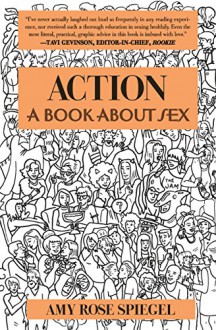
Action: A Book About Sex is the cool guy/gal you hooked up with in high school or college who was way too attractive and confident for you but helped you find your way from theory to concept (in a sexual sense). After years of euphemisms and pseudo-psychology, and (worst of the bunch) seduction guides and self-help books, Action is the grown-up (but not too grown-up) discussion about sex we never knew we needed. It's direct, sensitive, encouraging, and mostly just a lot of fun -- alone or with friends!
Sex writing usually wavers between the sensual and the technical, Action doesn't much bother with either. It's crass and straightforward, but not demeaning. Spiegel shows that sex doesn't have to be so self-serious to be mind-boggling enjoyable, or to be meaningful for that matter. She doesn't really present any new information here, at least not to anyone buying a book about sex who isn't a 15 year-old boy, but she kind of opens the blinds on all the kind of unspoken assumptions many of us harbor about sex/dating/etc. and exposes them to the daylight. This happens in a number of ways but I wanted to focus on three themes that come out of the book. They're kind of suggestions but also demonstrated in the way Spiegel writes.
The first is openness. Spiegel says we should really be talking more about sex. About consent, about identity, about sexuality and kinks, about relationships, about positions, and everything else. Especially with your partners (obviously), but in public life too. It's kind of like talking about money, decorum tells us to hush up, but some frank discussions would do a lot of good in both realms.
Spiegel starts with a section saying as much right away, which makes openness less a theme than just a thing she says, except it continues popping up throughout the book. I mean, if the branding wasn't so bad it could be called "Talking: A Book About Sex." Talk to new people you might want to sex! Talk with people you already sex to make sure your sex is as good as it can be (for both involved)! Talk with someone your maybe about to sex to see if they're really down with that! Talk about trying something new! Talk about a trip to the sex store! It touches on a bonus theme of embarrassment I won't really discuss, but by not talking about sex we are closing off possibilities we can really enjoy. We've all been frustrated by situations where everyone is deferring and nobody will make a decision where to go for dinner, it's like that except no one bothers to mention dinner and just hopes to happen into a restaurant and then order food for the other person.
Second: Spiegel reminds us that there are two people (or three) in the bed. Note the emphasis on people. Gender always comes second to humanity in this book, because this is obviously the treatment we've needed for a very long time. Action is a book about sex, largely for entertainment but with a lot of practical content too, and that content is about having a better sex life. What it is not is a book about seducing women, or pleasing men. Spiegel is always working under the assumption that the other party in this matter is a thinking, feeling person and would like to be treated as such.
Of course, Action gets more specific when it comes to handling genitalia, but when it comes to seduction technique or being better in bed it's not about some technique or trick or pseudo-psychology, it's about respect and openness (see above). Success isn't about who you have sex with, it's about how you feel about that person and both of you having a good time. There's no shortcut there, you just have to think about it and work it out. Actually, there's one technique she says will make you as insightful as Mel Gibson in What Women Want but you'd have to go back and read point 1. (Edit: more insightful than Gibson, he mostly uses his gendered mind-reading in that movie to be a manipulative dick.)
Lastly: Spiegel grounds the discussions in real terms and situations. Some jargon does appear here -- intersectionality, non-binary, cisgender, BONE-A-ZONA -- but Spiegel uses it sparingly and playfully. Like I said above, she is unflinching, as it should be: she's writing a book about sex, now is not the time to get coy. Her candidness makes everything better and more clear because she describes something real and specific. Here she talks about just meeting people:
"Eight times out of ten, if you introduce yourself to a new person, assume some air of great purpose about you, and tell them something honest and enticing in its irregularity (especially if it also happens to be funny), that person will talk to you."
Spiegel then spends most of the chapter on talking: good pick-up lines, having something to say, asking questions, pushing when they answer "good" or "not much." It's five pages on what is essentially you're time-tested, basic script hook up, but she demystifies it. Here's where you are, here's what you do, there's no script, just some prompts, because the biggest problems are getting the gumption up to talk with someone and have the grace to move on when it doesn't pan out. Again, it's not about seduction, it's about meeting people (see point 2). If you're open and outgoing, opportunities will arise, but if you fixate on someone you forget they are a real person with their own feelings and tastes that has no obligation to return your attraction.
When Spiegel does share tips they are broad and she doesn't claim universal, though they seem like a good idea. Spiegel admits she's into good posture, or how she digs getting oral sex while lying on her stomach, but everyone has their own preferences, it's what makes the world go 'round.
Then it all cycles back to point 1, or maybe they're all one point: talk respectfully about sex in clear terms, you wild lovechild.
SUMMARY: This was kind of a weird review, but this was also an unusual book and I was really interested in the way everything was presented. The result was something about style and about what spoke to me, but also recounting some messages from the book. This makes some sense because form is important and the way Spiegel presents the information reflects the approach she is advocating: direct, unashamed, sensitive and curious. I hope this review made sense is all I'm saying. Thanks for reading!

 Log in with Facebook
Log in with Facebook 









